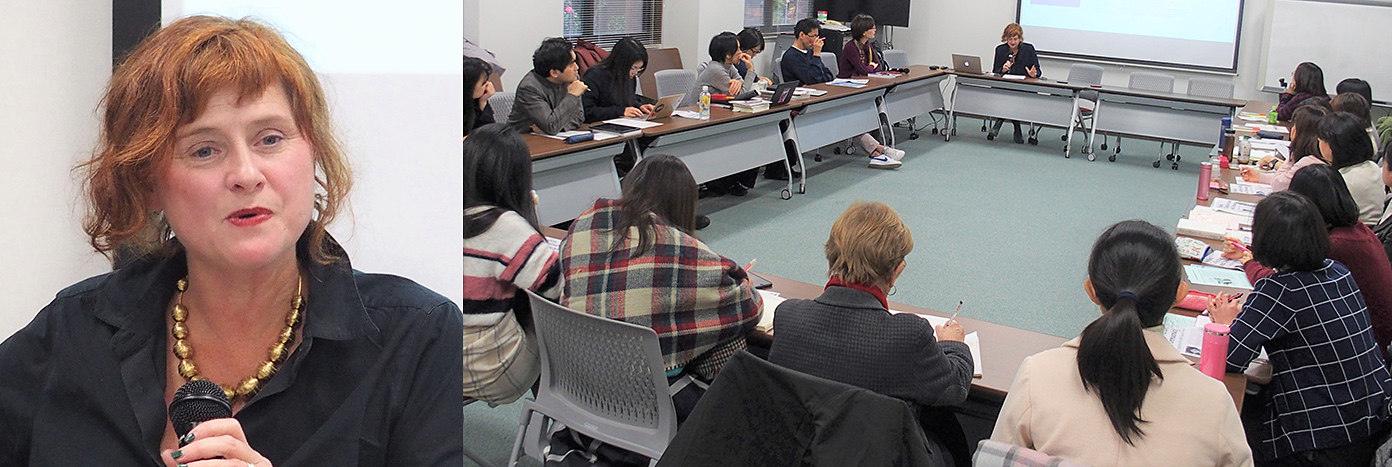IGS Seminar: Bodies, Collective Action and Democracy: Engaging with Judith Butler’s Work
On 13 December 2018, the Institute for Gender Studies (IGS) at Ochanomizu University hosted a seminar entitled ‘Bodies, Collective Action and Democracy: Engaging with Judith Butler’s Work’, featuring a lecture by Dr Delphine Gardey, a professor at the University of Geneva who was residing at IGS as a visiting professor. The theme of the lecture was taken from a book that Gardey had co-edited, Politics of Coalition: Thinking Collective Action with Judith Butler (2016), which examines the theory of coalition that Judith Butler began to develop in the 2000s, from a European perspective. The thorough analysis that Gardey presented and the subsequent lively discussion allowed participants to deepen their understanding of Butler’s thinking.

In the 2000s, Butler began to focus on the development of a new key term for social movements that could be an alternative to identity politics. In Gender Trouble (1990), Butler presented the concept of performativity in relation to questions of gender, sexuality and queerness, and her later discussion of the idea of coalition was extended from that discussion. Her idea of performativity is useful for analysing the complex relationships among identity, body and power. In relation to gender identity, Butler investigated the idea of becoming a woman, suggesting that the commonly accepted notion of being a woman, wherein a woman was defined as having a biologically female body, was not accurate to everyone. This understanding may invite people to redirect essentialist perceptions of identity, and this discussion led to the development of the new term for coalition.
Identity politics led to the formation of groups that pursued political action on behalf of specific social identities, such as gender, race and sexuality. Although this approach did empower those belonging to minority groups who suffered from social discrimination, group formation based on social identity inevitably led to exclusion and to competition between groups. The necessity for a new, all-inclusive concept to unite people in those individual groups has been urged. What Butler suggests here is that we focus on social vulnerability and employ the concept of precarity.
This concept, according to Butler, enables the establishment of coalitions to demand the right to a stable life. The focus needs to be shifted from identity to the body. Here, participation in the coalition no longer depends on who you are: your gender, race and sexuality are irrelevant. However, appearing at the site of political action has significant meaning, in that your body is present. Such sites are the place for democratic politics, which, it is asserted, is part of the public sphere but has excluded socially vulnerable people. A focus on bodies, rather than identities, may allow an inclusive political space and community to be formed. After reporting this Butlerian position, Gardey’s talk moved on to related thinking produced by Europeans. For example, Jacque Derrida’s concept of hospitality may provide an appropriate account for what behaviour can be expected from individuals in a universally inclusive society.
In the following discussion, Butler’s theories were examined from various perspectives. One question that was raised was the applicability of Butler’s theories to Japanese society. Gardey explained that some concepts, such as gender as performance, could be useful for the analysis of different societies and their cultures. She added that Butler’s work was necessarily built upon an analysis of American society. This means thinkers’ culture of origin will be felt in their theories. Gardey also referred to the inherent characteristics of philosophy, which was Butler’s own disciplinary background. Philosophy is preconditioned on the existence of universal theories. This approach takes account of a range of phenomena in order to extract what is common to them and to make generalisations. When you read philosophy, it is important to keep its disciplinary tendencies in mind rather than taking them for universal without a question. Another aspect that Gardey noted was the influence of French academia, which considers the traditions of conventional disciplines to be crucial and tends to undervalue relatively new or interdisciplinary studies, such as cultural studies and gender studies.
Gardey’s research is interdisciplinary, stretching across history, anthropology and sociology. This orientation has made her more conscious of the universality of academic knowledge, disciplinary characteristics and regional academic cultures. At the end of the seminar, Gardey gave a short presentation on the Institute of Gender Studies at the University of Geneva, which she is affiliated with. Like IGS, the Institute conducts interdisciplinary research projects from a global perspective. We look forward to seeing further development of the relationship between these research institutions in the near future.
Kumi Yoshihara (Project Research Fellow, IGS)
【Event Information】http://www2.igs.ocha.ac.jp/en/events/2018/12/1213/

